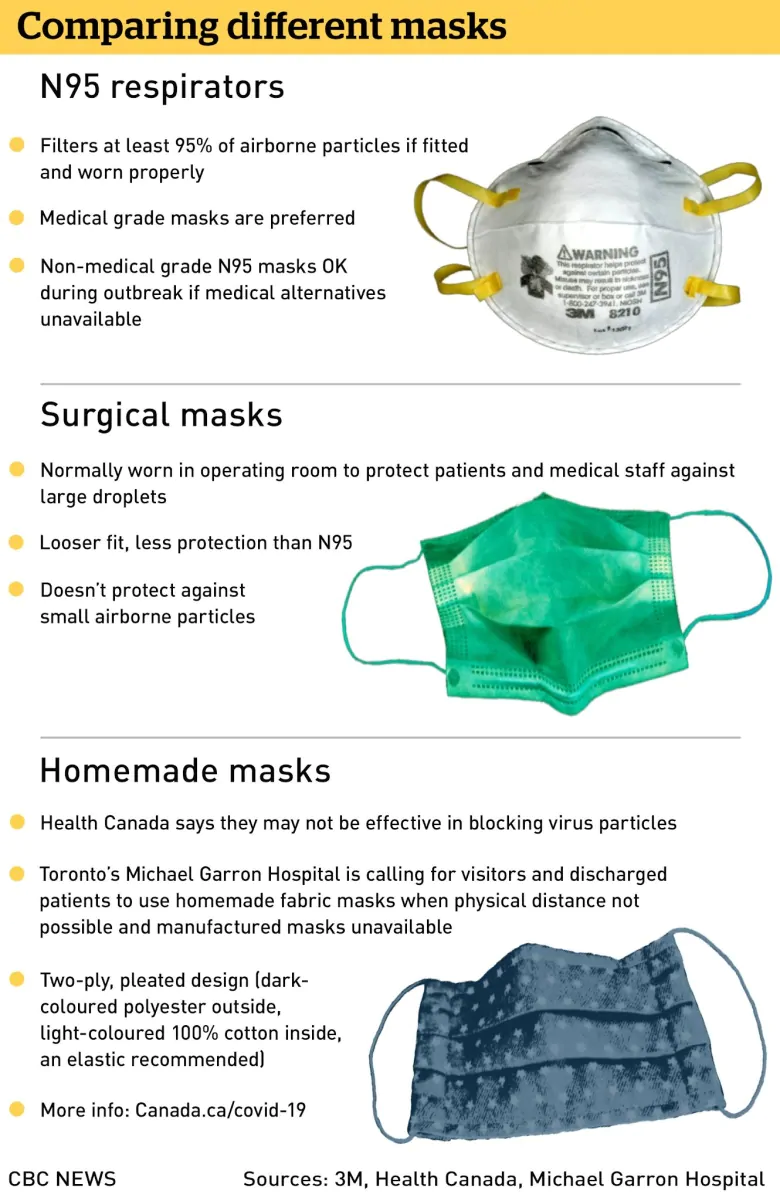A closer look at what public health officials and the research say about who should wear a mask, how to wear one properly and what kind of protection it offers.
Public health officials in North America initially discouraged healthy people from wearing masks, saying there’s no evidence they provide effective protection against the spread of the coronavirus, which causes COVID-19.
But recently, some, including those in Canada and the U.S., have said that wearing non-medical masks in tandem with physical distancing measures could limit the transmission of the virus.
In areas where COVID-19 activity is present, in addition to handwashing and cough etiquette, “use of non-medical masks or face coverings is recommended as an added layer of protection when physical distancing is difficult to maintain,” said Theresa Tam, Canada’s chief public health officer, on May 20.
Officials in some Asian countries have encouraged mask use since the early days of the pandemic.
Additionally, health workers in the U.S. Canada say they need masks for protection and are struggling with shortages.
Here’s a closer look at what public health officials and the research says about who should wear a mask, how to wear one properly and what kind of protection it offers.
WATCH | Dr. Theresa Tam explains her latest recommendation on mask use:
Dr. Theresa Tam, Canada’s chief public health officer, is now recommending that Canadians wear masks in public as an “added layer of protection” whenever physical distancing is not possible. 2:27
What are the different kinds of masks, and what protection do they offer?
There are three main types of masks that are available:
- N95: These are tight-fitting masks that are designed to seal around the nose and mouth and screen out 95 per cent of small airborne particles. They’re likely to prevent transmission of aerosolized virus — those suspended as a mist in the air. Because of that, they’re used by health-care workers in specific medical procedures that generate aerosols, such as inserting a breathing tube or bronchoscopy (imaging someone’s lungs and air passages), said Dr. Mark Loeb, a professor of pathology and clinical epidemiology at McMaster University in Hamilton.
- Surgical or medical masks: These are looser fitting, more flexible disposable masks that are considered effective barriers against large droplets released by talking, coughing or sneezing — the main way COVID-19 is likely transmitted.
- Non-medical cloth masks: You may have seen volunteers sewing these reusable, washable masks for distribution, and some hospitals in the United States were even asking for them as a last resort because of shortages of other kinds of masks. At least one Toronto hospital has requested such masks for people who don’t work in health care, such as hospital visitors or recently discharged patients. However, Gardam notes they’re quite porous and their effectiveness hasn’t been studied much.
WATCH | Dr. Samir Gupta explains what you should consider before putting on a mask against COVID-19:
Dr. Samir Gupta provides crucial information about wearing a mask during the COVID-19 pandemic and what to think about before putting one on. 2:30
Which mask is recommended for health-care workers?
For everyday medical care, recommendations vary, said Loeb. For example, the U.S. national Centers for Disease Control and Prevention recommends the use of N95 masks, but the Public Health Agency of Canada recommends a medical mask, and Ontario previously recommended N95 and is now recommending medical masks.
However, Loeb said N95 masks are definitely needed for special medical procedures that generate aerosols.
The World Health Organization says cloth masks are not recommended for health-care workers “under any circumstances.“
How effectively do masks protect health-care workers?
Consistent use of either N95 or surgical masks reduced infection with SARS, another coronavirus, by roughly 80 per cent among health-care workers, said Loeb, based on both his own research and a study by another research group.
Both the SARS studies and a more recent study on a variety of respiratory illnesses, including coronaviruses, didn’t find a big difference in protection between the two kinds of masks for regular medical procedures. Loeb is currently setting up a randomized control trial to confirm whether there is a difference for COVID-19.
However, Dr. Michael Gardam, chief of staff at Toronto’s Humber River Hospital, noted that masks are never used alone as personal protective equipment by health-care workers — they go with face shields, gowns and gloves.
The one randomized clinical trial of cloth masks in a health-care setting for protection against respiratory illness — done on influenza, not COVID-19 — found that they let through 97 per cent of virus particles and actually increased the rate of infection among health-care workers. That same study found surgical masks failed to block 44 per cent of virus particles.
The authors of that 2015 study recently wrote an addendum to their research because they have received so many questions about it since the coronavirus pandemic began.
When are masks recommended for members of the public?
N95 masks are not generally recommended for the public in North America for protection against disease.
But the World Health Organization (WHO) recommends wearing a medical mask at home, if you:
- Have symptoms, like coughing or sneezing, as it can reduce contagious droplets from being sprayed around you.
- Are caring for someone with a suspected COVID-19 infection.

Outside these circumstances, the WHO says medical masks should be reserved for health care workers.
Although initially public health officials in North America and Europe said healthy people didn’t need to wear masks in public and people with respiratory symptoms shouldn’t be leaving their homes at all, more recently, they h

